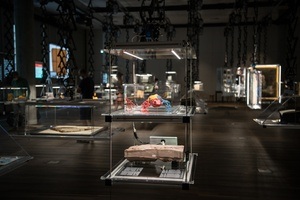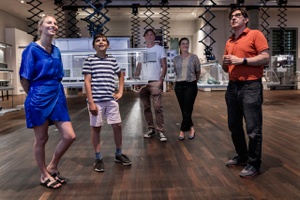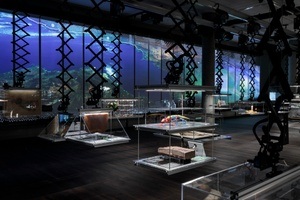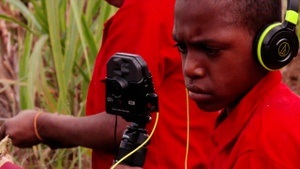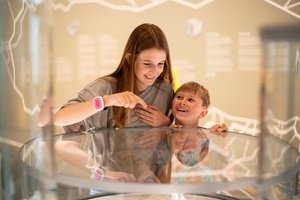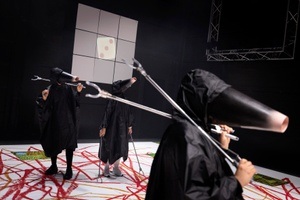Die Spree und wir. Von unserem Verhältnis zu einem Berliner Gewässer
In the organizer's words:
Berlin is built close to the water. Berlin was built from the water. And yet today we have a rather troubled relationship with the city's most famous river.
Who can claim to really take the Spree seriously - beyond its function of supplying the city with fresh water or its role in transportation or tourism? In view of climate change, calls for sustainable urban development and the transformation of transportation, doesn't the Spree deserve more attention? As a non-human actor, does it need to be given more rights of its own? And are there opportunities for the Spree to regain its independence - as a meander through Berlin, as a refuge for urban flora and fauna, as a bathing destination for people?
At SPÄTI, we will examine the Spree from an artistic, scientific and civil society perspective. We will ask what role the Spree has played for the city in the past, how we deal with it today and whether we can develop a different relationship with it in the future.
The actor Maximilian Grünewald and the guitarist Sven Daniel Bühler will first approach the Spree artistically with the fairy tale of the giant Sprejnik. Grünewald will then talk about how he developed new forms of dealing with water in a participatory way with residents of the Spreewald as part of the scientific-artistic project "River Stories" (part of the experimental laboratory "Anthroposcenes" at the HU).
The geographer and ethnologist Tomás Uson from Humboldt University will discuss how we can shape our relationship to water in times of rapid environmental change. Charlotte Hopf will report on the commitment of Flussbad e.V., which she co-founded and which takes the Spree seriously as a bathing water - and thus also wants to change the environment of the Humboldt Forum in the long term. The Spree will also be taking a seat at the podium table.
There will be drinks and music after the event. You can also watch the short film Bellerophonte's Dream, made by Anthroposcenes in the Spreewald.
PROGRAMME
16:30: DJ Playlist
18:00: Fairy tale of the giant Sprejnik with musical accompaniment
18:30: Talk with Maximilian Grünewald ("River Stories"), Charlotte Hopf (Flussbad e.V.), Tomás Uson (Humboldt University). Moderation: Bastian Herbst.
19:15: DJ set and drinks
PARTICIPANTS
Sven Daniel Bühler is an actor, radio play narrator and musician. He can be heard in radio plays on NDR and SWR. He has been working as an actor since 2015, including in the feature film Los Veganeros. In 2021, Sven Daniel Bühler was seen in a continuous leading role as "Sven" in the sitcom Ich dich auch! on ZDFneo. He plays several instruments and works as a musician in German theaters and wrote the music for the Spreewald production.
Maximilian Grünewald is an actor and freelance dramaturge and received his education at the Felix Mendelssohn Bartholdy Academy of Music and Theater in Leipzig. This was followed by engagements at the state theaters in Karlsruhe and Hanover. In his work, he deals with the relationship between man and nature and the dramatization of scientific discourse. In 2020, he co-founded the collective ANTHROPOS EX. The collective looks for ways to give non-human actors a stage and experiments with methods from theater, film, the visual arts and the natural sciences. This has led to collaborations with students from ETH Zurich, the Zurich University of the Arts (ZHdK) and the Karlsruhe University of Arts and Design (HFG), among others. Maximilian Grünewald developed the artistic concept for "River Stories" in close collaboration with scientists, artists and residents of the Spreewald village of Raddusch.
Charlotte Hopf is an architect and architectural historian who lives and works in Berlin. She has been chairwoman of the Flussbad Berlin e.V. association since 2012 and was the master builder of Berlin Cathedral from 2011 to 2016.
The Spree is an approximately 400-kilometre-long river that flows 700 meters through the Czech Republic and the three federal states of Saxony, Brandenburg and Berlin. Classified by people as a tributary of the Havel, the three sources of the Spree lie in the Lusatian Highlands, where, according to Sorbian legend, the giant Sprejnik created it by shooting arrows. In addition to the Lusatian lowlands, where it is filled by groundwater extracted from open-cast mining, the Spree flows through the Spreewald forest named after it and 44 kilometers through Berlin. In the capital, it meanders - divided into branches and canals - around Museum Island and the Humboldt Forum, among other places. With a flow speed of just 50 centimetres per second, it likes to take it easy, and in Berlin it lingers a little longer at just nine meters per second. Once a popular bathing water, its water quality has only been improved in recent years to such an extent that swimming is once again possible, at least some of the time.
Tomás Uson is a research associate at the Institute of Geography at Humboldt-Universität zu Berlin. His research interests range from disaster and risk studies to multispecies research, urban studies and the temporality of environmental degradation. As a research associate in the BUA project "Re-Scaling Global Health: Human Health and Multispecies Cohabitation on an Urban Planet" (ReHealth), Tomás investigates the intricate geo-symbiotic interactions between bacteria, heavy metals and humans in highly polluted environments in Peru and Spain. He also analyzes the challenges and opportunities of the rights of nature as a legal framework for redefining our understanding of health from a multispecies perspective.
Bastian Herbst studied Modern and Contemporary History, Scientific Politics and Public Law at the Universities of Freiburg, Rennes and Basel. From 2019 to 2021, he was a research assistant in the Department of Education and Outreach at the German Historical Museum and has been Curator of Outreach at the Humboldt Lab since November 2021.
COOPERATING INSTITUTIONS
AnthropoScenes combines theater and science - everything revolves around water. Whether on the stages of Berlin or at markets in Brandenburg, various audience groups, scientists and artists are invited to experiment together so that a sustainable future for water becomes part of the public debate. The project is embedded in the inter- and transdisciplinary research consortium, Climate and Water Under Change (CliWaC), which is investigating the effects of climate change on water resources in Berlin and Brandenburg. It is funded by the Berlin University Alliance as an experimental laboratory and will run until the end of 2024.
Flussbad e.V.: Founded in 2012 by fifteen river bathing enthusiasts, the non-profit association now has over 500 members who are passionate and committed to a liveable and sustainable urban development of Berlin, to keeping the inner-city Spree clean and using it intelligently as a natural resource and to reclaiming the almost two-kilometre-long Spree Canal in the historic city center as a recreational and regeneration area for the city's residents and visitors. The association has been funded by the state of Berlin since 2015. The association also received funding from the federal program "National Urban Development Projects" until 2023.
- Free of charge, no ticket required
- from 12 years
- Language: German
- Location: Mechanical arena in the foyer
- Part of: SPÄTI
- Belongs to: After nature
This content has been machine translated.



